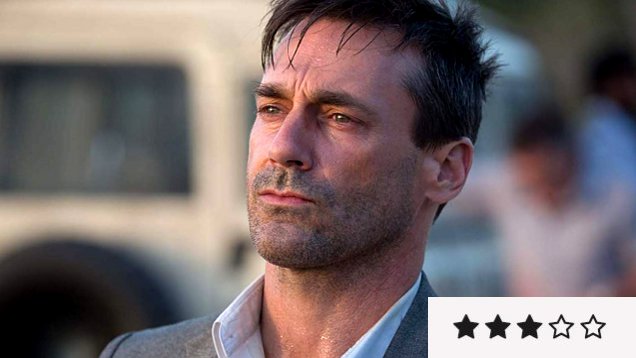Beirut review: Jon Hamm gets his best big-screen role to date

Across seven seasons of Mad Men, Don Draper could sell almost anything. Beyond the role that made him a star, however, Jon Hamm hasn’t had the same good fortune. His most convincing work has remained on the small screen, in comedic supporting parts in everything from 30 Rock to Wet Hot American Summer: First Day of Camp to Unbreakable Kimmy Schmidt to Toast of London – but with Beirut, the actor gets the best cinematic leading role of his career.
Hamm plays Mason Skiles, an American diplomat turned negotiator. In the Lebanese capital circa 1972, Mason is happy wining, dining and entertaining fellow dignitaries with his wife (Leïla Bekhti), and even sponsoring orphaned Palestinian boy (Yoav Sadian). Come ten years later, where the bulk of the film takes place, he cuts a vastly different figure. Now mediating small-town labour disputes back in the US, he’s trying to drink his sorrows away in grimy bars and cheap motels. Suddenly forced to return to Beirut – ordered rather than asked, even though he’s long been off the government’s payroll – he’s a man visibly haunted not only by past pain and loss, but by his own decisions.
the actor excels at playing men compromised by their choices and forced to live with the consequences
Don Draper in the Middle East, just sweatier and facing higher stakes, Mason isn’t. Still, it’s easy to see why the part is such a great fit for Hamm’s charming complexity. Once again peddling powers of persuasion, the actor excels at playing men compromised by their choices and forced to live with the consequences. Mason has more of a conscience than Sterling Cooper’s best ad man. He doesn’t want to buy the world a Coke, or pretend that advertising is the same as enlightenment. Nonetheless, he’s willing to do and say whatever it takes to get a deal done.
In Tony Gilroy’s twisty script – one first written back in 1991, but considered too topical at the time – that deal takes the form of a hostage negotiation to extricate Mason’s abducted former colleague Cal (Mark Pellegrino). The kidnappers have specifically requested Mason’s services, for reasons the on-the-ground American team don’t understand. In fact, the US Embassy’s Gary Ruzak (Shea Whigham) and the CIA’s Donald Gaines (Dean Norris) barely expect him to remain sober enough to make the exchange, and would be content to send him home. Only his handler, Sandy Crowder (Rosamund Pike), lends any support, driven by her own suspicion that little is as it seems.

“Forget it Mason, it’s Beirut” isn’t a line that’s uttered in Beirut. But it could’ve been, with Gilroy and director Brad Anderson (The Machinist, Transsiberian) combining the noir-ish spirit of Chinatown, the espionage antics of a John Le Carre novel (or the latter’s many screen adaptations) and the ingrained conflict of the titular setting. While the war-torn locale makes too easy a metaphor for Mason’s troubled, fractured state, this solid thriller engages with the region’s conflict as it paints a picture of disillusionment, double-dealing, and the dirty deeds committed and facilitated on all sides.
Predictable plot developments come and go, but they always bear weight; messiness and murkiness reigns, even when Gilroy leans on a number simplified characterisations. With the assistance of cinematographer Björn Charpentier, Beirut is also a visually layered film, shot with a suitably grim, deep colour palette and framed with an eye for the chaos always lurking on the edge of any given situation.
Indeed it’s quintessential Gilroy, steeped as Beirut is in the screenwriter’s favoured moral conflict — the kind his other scripts, including four Bourne movies, the George Clooney-starring Michael Clayton and the US remake of State of Play, all traversed. Of course, that mood sticks to Hamm like the boozy perspiration always glistening on his brow; even if he wasn’t forever Don Draper in many viewers’ minds, it’s a part he wears better than Mason’s rumbled shirts. He’s also in fine company, though the cast occasionally prove better than the film they’re in. Whigham continues to rank among today’s under-sung character actors, and a thoughtful Rosamund Pike fares better than in this year’s ostensibly comparable but much lesser effort 7 Days in Entebbe. Just ignore Norris’ terrible hairpiece.

















